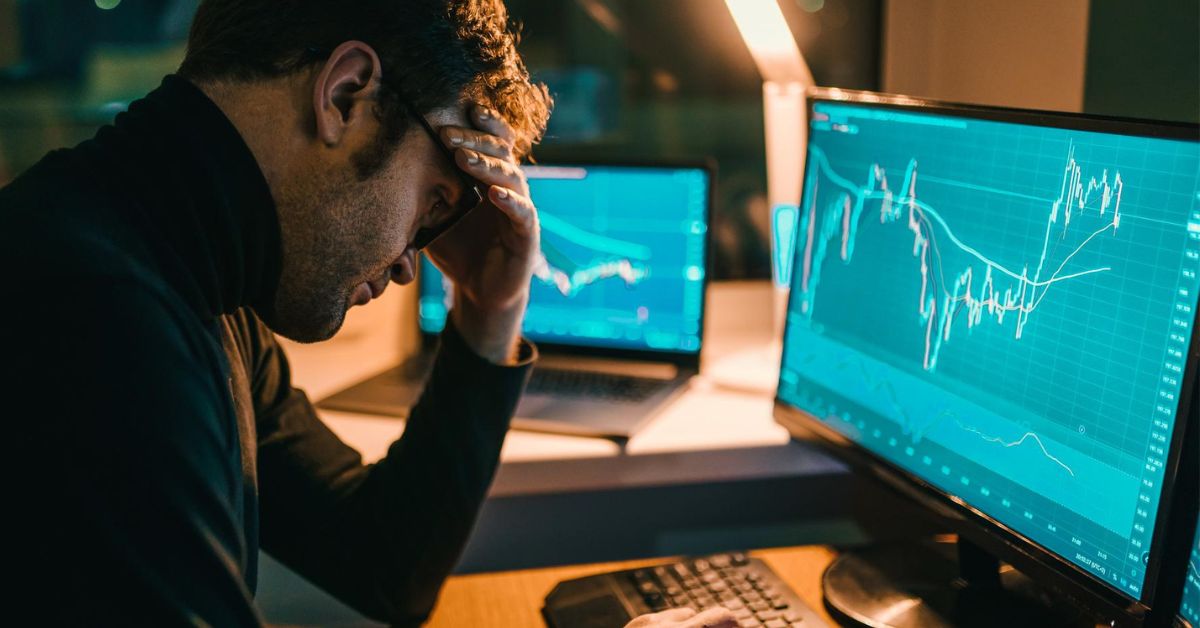Most traders focus on technical analysis, charts, and strategies when trading. However, psychology plays an equally important role in determining whether a trader succeeds. Successful trading often comes down to understanding the emotional and psychological aspects. So, what percentage of psychology is trading?
In this article, we’ll explore how much psychology affects trading. You will learn how mastering your mindset can give you an advantage in the markets. In fact, the proper psychology might just be your most significant trading advantage.
Prime XBT offers traders advanced tools and a reliable environment for managing psychology and executing strategies. So, join PrimeXBT today! Use promo code PRIMEOTT to receive a +7% bonus on your deposit. However, even with the best tools, a trader’s mindset plays a significant role. Feelings like fear, greed, and anxiety can lead to impulsive trading and expensive mistakes.
Basics of Trading Psychology

Trading psychology is the mental state that affects trading decisions. It involves managing emotions, maintaining discipline, and controlling cognitive biases. Emotions such as fear and greed often drive impulsive trading decisions, which can lead to significant losses if not properly managed.
Cognitive biases, like confirmation bias and loss aversion, also play a significant role. Confirmation bias makes traders favor information that supports their existing beliefs. Loss aversion, on the other hand, causes traders to hold onto losing trades longer than they should.
Discipline is another crucial aspect of trading psychology. It helps traders stick to their trading plans, even in volatile markets. Patience, too, is vital, as it prevents traders from making hasty decisions. The mastery of these psychological elements can significantly increase the success of a trader.
What Percentage of Trading is Psychology?
The exact percentage of psychology in trading is debated. Some experts suggest that trading is 70% psychology, while others argue it’s closer to 50%. Trading strategies are essential, but without psychological control, even the best strategies can fail.
Emotions and mental biases often override logical decision-making, making psychology a critical factor in trading success. Studies show that traders who focus on psychological mastery tend to perform better over time.
Many successful traders believe that psychology outweighs strategy. They emphasize that mindset is what truly sets winning traders apart. However, it’s difficult to quantify the exact percentage, as both psychology and strategy are intertwined.
Ultimately, the importance of psychology in trading must be considered. It is the most significant factor in your trading journey.
Interactions Between Psychology and Trading Strategies
Trading strategies provide a framework for decision-making. However, psychology determines how well those strategies are executed. Even the best strategies can fail without the right psychological approach. Emotional control is vital to sticking to your plan, especially during market fluctuations.
Technical and fundamental analyses are essential tools. However, psychological analysis adds another layer of insight into market behavior. Knowing your psychological tendencies can provide you with a competitive advantage. This awareness allows you to tailor your strategies to suit your emotional strengths and weaknesses.
Some traders even argue that psychology is the most crucial strategy. Successful trading often comes down to mastering emotions like fear and greed. Traders can improve their performance if they combine psychological insights with technical strategies. Ultimately, psychology and strategy are not separate— they are deeply interconnected.
Is Trading More Psychology or Strategy?

The debate between psychology and strategy is ongoing. Some argue that psychology dominates, while others emphasize the importance of strategy. Those in favor of psychology believe that emotions drive most trading decisions. They say that even the best strategy is useless without psychological discipline.
On the other hand, strategy advocates stress the importance of analysis and planning. They believe that a solid strategy can override emotional impulses. However, most agree that a balance is necessary. Both psychology and strategy play crucial roles in trading success.
A trader with a great strategy but poor psychology may still fail. Conversely, a psychologically strong trader with a weak strategy may struggle. The key is to integrate both effectively. Understanding this balance is essential for long-term trading success. Ultimately, neither psychology nor strategy should be underestimated. They work best when combined, creating a powerful trading approach.
How to Improve Your Trading Psychology
Improving your trading psychology is essential for long-term success. The process involves developing self-awareness, emotional control, and discipline. Focusing on these key areas can help you make better decisions and reduce the impact of emotions. Let’s take a closer look.
Build Self-Awareness
Improving trading psychology begins with self-awareness. Understanding your emotional triggers is key to managing them effectively. One helpful technique is maintaining a trading journal. Recording your thoughts and feelings during trades helps you identify patterns. This self-reflection allows for better decision-making and emotional control.
Develop a Robust Trading Plan
A well-defined trading plan is crucial. It provides structure and reduces emotional decision-making. Your plan should include entry and exit strategies, risk management, and trading goals. Sticking to your plan, especially in volatile markets, is essential. Discipline in following your plan reinforces consistency and prevents impulsive actions.
Practice Mindfulness
Mindfulness practices, such as meditation, can significantly enhance emotional control. Regular mindfulness exercises help you stay calm during stressful trading situations. This calmness reduces impulsive decisions, allowing for more rational thinking. Consistent mindfulness practice can improve focus and overall trading performance.
Set Realistic Goals
Setting realistic goals is vital for maintaining a positive mindset. Unrealistic expectations often lead to frustration and emotional stress. By setting achievable goals, you can stay motivated and focused. Realistic goals help you maintain a healthy psychological state, improving long-term trading success.
Embrace Losses as Learning Opportunities
Every trader experiences losses. Instead of letting them affect your emotions, view losses as learning opportunities. Analyze your trades to understand what went wrong and how you can improve. This approach helps you develop resilience and avoid repeating mistakes, strengthening your trading psychology.
Cultivate Patience
Patience is a critical aspect of successful trading. Waiting for the right trading opportunities rather than forcing trades can prevent emotional mistakes. Practicing patience helps you avoid impulsive decisions and stick with your trading strategy, leading to more consistent results.
Manage Stress Effectively

Trading can be stressful, and managing that stress is vital for maintaining a clear mindset. Techniques like deep breathing, regular exercise, and taking breaks can help manage stress levels. An effective stress management strategy keeps you focused and prevents emotional trading, contributing to a more balanced trading psychology.
If you want to take your psychological skills to the next level, check out our psychology coaching sessions at On Tilt Trading Store. These sessions will help you identify your emotional triggers and develop strategies for successful trading while managing your mental health.
FAQs
Is trading mostly psychological?
Yes, trading is mainly psychological. Many traders believe that emotions significantly influence decision-making in the markets. Fear, greed, and anxiety can lead to impulsive actions and poor choices. A trader’s mindset often determines their ability to stick to a strategy during market fluctuations.
Technical and fundamental analyses are essential, but mastering psychological aspects is equally important. Traders who understand their emotional triggers can mitigate risks and improve outcomes. Therefore, while strategies are crucial, the psychological component cannot be ignored. For long-term trading success, emotional resilience and discipline are essential.
Is trading 80 percent psychology?
Traders often claim that trading is 80% psychology and 20% skills. Many believe that emotional control significantly impacts trading decisions. While it’s difficult to quantify, psychology plays a crucial role in trading success. Traders often struggle with fear, greed, and anxiety, which can lead to impulsive decisions.
A solid psychological mindset helps traders stick to their strategies during volatile market conditions. Ultimately, while the exact percentage may vary, psychology undeniably influences trading outcomes. Balancing both strategy and psychology is essential for achieving long-term success in the markets.
Is trading 90% psychology?
Many traders claim that trading is 90% psychology and 10% skills, emphasizing the mental aspects of trading. They believe emotional control is vital for making rational decisions. In high-pressure situations, emotions like fear and greed can cloud judgment, leading to costly mistakes.
Market fluctuations can make it difficult for traders to stick to their strategies without a solid psychological foundation. While the exact percentage is subjective, the importance of psychology cannot be overstated. Mastering your mindset is crucial for consistent trading success. Therefore, long-term profitability requires attention to both psychology and strategy.
What is the psychology of winning traders?
The psychology of winning traders involves several vital traits and habits. Successful traders exhibit solid emotional control, allowing them to manage fear and greed effectively. They maintain discipline, sticking to their trading plans even during volatile markets. Winning traders also practice patience, waiting for optimal trading opportunities instead of forcing trades.
Moreover, they embrace losses as learning experiences, analyzing their mistakes for improvement. A positive mindset and resilience are crucial for bouncing back from setbacks. Continuous self-reflection and a commitment to learning further enhance their trading psychology. Overall, a winning trader’s mindset combines discipline, patience, and a focus on growth.
Read More: Trading Psychology: A Comprehensive Guide
Conclusion
You are now aware that understanding psychology is crucial for trading success. Emotions can significantly affect decision-making, often leading to costly mistakes. So, striking a balance between strategy and mindset is essential for long-term profitability. Do you struggle with losses caused by emotional trading decisions?
If so, the Vestinda Trading app will be an excellent solution. Using automated crypto trading strategies will remove the emotional burden from your trading. The app helps you avoid pitfalls like panic selling and overtrading, letting you trade confidently. With Vestinda, you can control your trading journey and get more consistent results.



